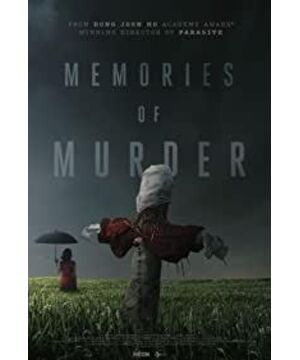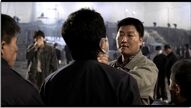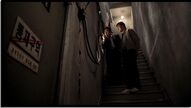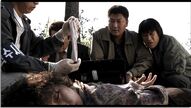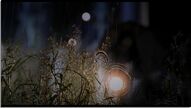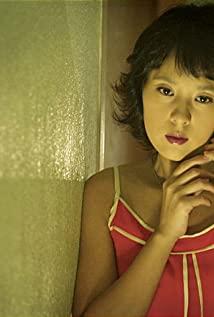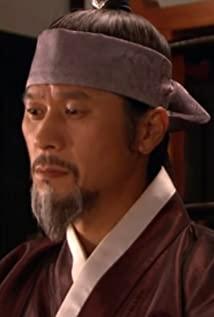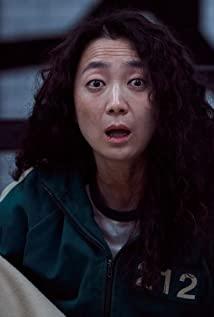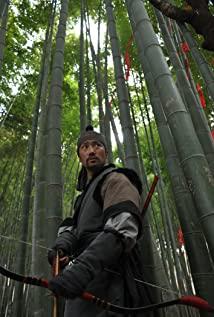The ordinary face - "Memories of Murder" film reviewers remember that the first time I saw this film was in my freshman year, and it was also when I first started to get in touch with Korean films a lot. There are many Korean film rankings that list this film as top 1, and it also has a good reputation on the Internet. In recent years, even domestic films have been vying for this film. Many directors' debut films have also been consistently called "Chinese version of Memories of Murder", which can be seen from this The film has a good reputation. I was shocked when I first saw this film. No matter in terms of depth of idea, actors' performance, directing skills, or even more sad and helpless case facts, this film is a rare masterpiece. At the beginning of the film, the audience is drawn into South Korea in the 1980s: the camera slowly moves into the distance, the golden wheat waves are swaying in the gentle wind, the sound of the tractor is gradually approaching, and the children are frolic. Next, a wide-angle camera shot upwards, the vast blue sky "shrouded" a few white clouds, the village in the distance was quiet, a line of cursive "Memories of Murder" on the screen, and the sudden and ethereal background music sounded, sadly and shocked, and the story began. At the end of the film is the same scene. The murderer of the case is still unknown, so all kinds of speculations about the murderer on the Internet are limited by the facts of the case and have no evidence. The truth shown in the film is also stumbled. , the truth disappeared in such a shake of the head. Obviously, director Bong Joon Ho is not making a movie about how to solve a case. Detective Park, played by Song Kang-ho, is the most full of characters in the film, and the change in his case handling style with Seo Tae-yoon from Seoul, played by Kim Sang-kyung, is worth pondering about. Detective Park believes in traditional crime-solving methods. No matter who the suspect is, every time he is caught, he will be interrogated without giving the opponent any chance to defend himself. See through" the suspect's mind. Another police officer Xu from Seoul only believed in evidence and thought carefully. The method of deciding the case was a completely modern way of scientific reasoning. From the very beginning, he used the weather conditions and the victim's files to find out the body of the third victim. It can be seen that Officer Xu has a completely rational style of case determination at the beginning. However, the further the movie develops, the two people's style of case determination has changed. After experiencing repeated murders, Detective Park finally realized that he was doing nothing before, especially when he witnessed Guanghao being hit by a speeding train with his own eyes. , After he was splashed with blood, he began to reflect on his own way, accepted the scientific way of deciding cases, and chose to believe in reason and evidence. Under the rampant crime, Detective Xu gradually lost his patience and became restless and helpless. Finally, when he saw the girl who had put a Band-Aid on it lying in the woods and being beaten by Bingyu, Officer Xu completely lost his mind. He couldn't wait for the DNA test in the United States any longer. Even if he waited later, he still chose not to believe it. The few shots fired at the deep train hole were so helpless and hopeless, and so ironic, the evidence of his own conviction vanished in front of the excitement. The characters of the two were actually reversed once in the movie, which is why the movie finally settled on Detective Park played by Song Kangho. The political metaphor of the film itself is also extremely prominent. The night in the town seems to be calm, but here, there are continuous demonstrations every day. In the mid-1980s, South Korea was in the era of military rule. At that time, everyone was in danger. The government’s high-handed policies made everyone full of irritability and depression. People were prone to anger and extremes, and were extremely vulnerable and insecure. There is a scene in the movie that makes a deep impression. Detective Park, who was fighting against the fool Guanghao just now, and Police Officer Cao, who is good at kicking and kicking, are now sitting in front of the TV with Guanghao watching "The Sheriff". The long-term political turmoil and Repressive policies make the people feel insecure, and the people and the government can only communicate through violence. Both civilians and police need a real "sheriff" to give them a sense of security. In the movie, the metaphor of the leg of Officer Cao, who is good at flying kicks, is quite clever. Officer Cao kicked many innocent suspects with this leg, but in the end he had to be amputated because of the iron nails. The leg is like a police officer who enforces the law violently under the South Korean military. When the times tend to be democratic, when the times need to change, that leg is no longer "applicable" and needs to be eradicated. The imagery of an air-raid siren is repeated several times in the film, which could have been detected when the last victim was killed, but the need to suppress demonstrations elsewhere made it impossible for the guards to dispatch officers. We can only watch helplessly as the murderer calmly fiddles with the tools, the alarm sounds in the distance, the lights in thousands of homes are extinguished, and the victim's last hope is broken. During the period, the minds of Koreans who have experienced that era are full of grief and unbearable recollection. It is a permanent scar in their hearts, and this is a collective memory belonging to Koreans. Everyone should collectively recall whether I acted as the promoter of the murderer, and whether the attention and indifference of the entire government and the people is the real murderer. Director Feng Junhao fuses his personal destiny with the background of the country's era, so that everyone is no longer an outsider when watching this film, just like our fathers are watching the cultural revolution reflection of the fifth and sixth generation directors There will be a strong sense of substitution in the movie. Secondly, the performance of the actors in this film is also very exciting. Song Kang Haogui, who experimented with Detective Park, is one of the "three carriages" in the Korean film industry. In this film, he has created an extremely successful and full character image. And the stubborn black humor image makes people hate the simple and honest incompetent policeman. The character change in the second half is also well-founded, especially Song Kanghao staring at the screen in astonishment at the end. It is no exaggeration to describe him with excellent acting skills. In addition, the image of the Seoul police officer played by Kim Sang-kyung is also quite successful. , with the development of the plot, it has formed a contrast and transformation with Park Police's character. Including Park Hae Il, who played the last suspect, portrayed the image of the stern and perverse suspect as a real murderer. Finally, let's talk about the soundtrack of the whole film. There is very little soundtrack in the whole film. The ethereal sound of the piano keys at the beginning and the end conveys a helpless and sad atmosphere. Except for the scene of the wheat field, the whole film is almost cold-colored shots. . Bong Joon-ho's second feature film has won such an honor, which shows his ability to control the camera. In this work, director Bong Joon-ho effectively combines the commercialized crime genre with the helpless and desolate artistic atmosphere of the whole film, which has achieved a fascinating peak effect in both aspects. Every time I watch this film, the last scene of the film that makes me shudder: In 2003, the successful Detective Park has become a businessman (you must know that at this time, South Korea has completed the process of modern democratization and entered the era of democratization) , When he passed the wheat field again, the scene here was still the same, as if nothing had happened. When he asked the little girl what kind of face the murderer had, the girl replied: "very ordinary", and then Detective Park's face appeared in front of the camera. He stared at the screen with complex eyes mixed with consternation and hatred. There is an endless abyss in the hot tears. Detective Park's complicated eyes seemed to tell us that the murderer was so ordinary, so ordinary that he would not notice him when he walked back and forth beside you, so ordinary that everyone could be the murderer, but the hostile eyes seemed to remind Ying. Murderer in front of the curtain: No one will forget you. Every time I watch this film, the last scene of the film that makes me shudder: In 2003, the successful Detective Park has become a businessman (you must know that at this time, South Korea has completed the process of modern democratization and entered the era of democratization) , When he passed the wheat field again, the scene here was still the same, as if nothing had happened. When he asked the little girl what kind of face the murderer had, the girl replied: "very ordinary", and then Detective Park's face appeared in front of the camera. He stared at the screen with complex eyes mixed with consternation and hatred. There is an endless abyss in the hot tears. Detective Park's complicated eyes seemed to tell us that the murderer was so ordinary, so ordinary that he would not notice him when he walked back and forth beside you, so ordinary that everyone could be the murderer, but the hostile eyes seemed to remind Ying. Murderer in front of the curtain: No one will forget you. Every time I watch this film, the last scene of the film that makes me shudder: In 2003, the successful Detective Park has become a businessman (you must know that at this time, South Korea has completed the process of modern democratization and entered the era of democratization) , When he passed the wheat field again, the scene here was still the same, as if nothing had happened. When he asked the little girl what kind of face the murderer had, the girl replied: "very ordinary", and then Detective Park's face appeared in front of the camera. He stared at the screen with complex eyes mixed with consternation and hatred. There is an endless abyss in the hot tears. Detective Park's complicated eyes seemed to tell us that the murderer was so ordinary, so ordinary that he would not notice him when he walked back and forth beside you, so ordinary that everyone could be the murderer, but the hostile eyes seemed to remind Ying. Murderer in front of the curtain: No one will forget you.
View more about Memories of Murder reviews


